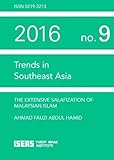The Extensive Salafization of Malaysian Islam / Ahmad Fauzi Abdul Hamid.
Material type: TextPublisher: Singapore : ISEAS Publishing, [2016]Copyright date: ©2016Description: 1 online resource (41 p.)Content type:
TextPublisher: Singapore : ISEAS Publishing, [2016]Copyright date: ©2016Description: 1 online resource (41 p.)Content type: - 9789814762519
- 9789814762526
- online - DeGruyter
- Issued also in print.
| Item type | Current library | Call number | URL | Status | Notes | Barcode | |
|---|---|---|---|---|---|---|---|
 eBook
eBook
|
Biblioteca "Angelicum" Pont. Univ. S.Tommaso d'Aquino Nuvola online | online - DeGruyter (Browse shelf(Opens below)) | Online access | Not for loan (Accesso limitato) | Accesso per gli utenti autorizzati / Access for authorized users | (dgr)9789814762526 |
Browsing Biblioteca "Angelicum" Pont. Univ. S.Tommaso d'Aquino shelves, Shelving location: Nuvola online Close shelf browser (Hides shelf browser)

|

|

|

|

|

|

|
||
| online - DeGruyter Strengthening Partnership for Regional Sustainable Development / | online - DeGruyter Rural Thailand : Change and Continuity / | online - DeGruyter Is a New Entrepreneurial Generation Emerging in Indonesia? / | online - DeGruyter The Extensive Salafization of Malaysian Islam / | online - DeGruyter Bipolarity and the Future of the Security Order in East Asia / | online - DeGruyter The Veil of Circumstance : Technology, Values, Dehumanization and the Future of Economics and Politics / | online - DeGruyter The Red Shirts and Their Democratic Struggle in Northern Thailand, April 2010 to May 2015 / |
Frontmatter -- FOREWORD -- The Extensive Salafization of Malaysian Islam -- The Extensive Salafization of Malaysian Islam -- AN OVERVIEW OF MALAYSIAN ISLAM -- THE KAUM MUDA: SALAFIS BUT NOT WAHHABIS -- SALAFIZATION IN POST-INDEPENDENT MALAYSIA: PAS AND ISLAMIST MOVEMENTS -- SALAFIZATION IN CONTEMPORARY MALAYSIA: UMNO, THE GOVERNMENT AND STATE INSTITUTIONS -- SALAFIZATION IN THE ERA OF NAJIB RAZAK -- MALAYSIA-SAUDI ARABIA RELATIONS AND CONCLUDING REMARKS -- REFERENCES
restricted access online access with authorization star
http://purl.org/coar/access_right/c_16ec
The form of Islam normatively understood and practised in Malaysia, i.e. Malaysian Islam, has undergone myriad changes since the 1970s as a result of gradual Salafization. Powered by Saudi Arabian largesse and buoyed by the advent of the Internet, this new wave of Salafization has eclipsed an earlier Salafi trend that spawned the Kaum Muda reformist movement. Recent surveys suggest that there has been a rise in the level of extremism among Muslims in Malaysia. While the majority is far from being enamoured by the Islamic State of Iraq and Syria (ISIS), the Wahhabi-Salafi doctrine that ISIS claims to represent in unadulterated form does appeal to many of them following the decades-long Salafization of Islam in the country. This tallies with media reports on increasing numbers of Malay-Muslim youth harbouring an attraction towards radical Islamist movements such as ISIS. Salafization, referring to a process of mindset and attitudinal transformation rather than the growth of Salafi nodes per se, is not restricted to individuals or groups identified as "Salafi", but rather affects practically all levels of Malay-Muslim society, cutting across political parties, governmental institutions and non-state actors. It has resulted in Islamist, rather than Islamic, ideals increasingly defining the tenor of mainstream Islam in Malaysia, with worrying consequences for both intra-Muslim and inter-religious relations. Responses to the Wahhabi-Salafi onslaught from the Malay-Muslim ruling elite in Malaysia have been ambivalent, and have had weak counteracting effects on the Salafization process.
Issued also in print.
Mode of access: Internet via World Wide Web.
In English.
Description based on online resource; title from PDF title page (publisher's Web site, viewed 30. Aug 2021)


